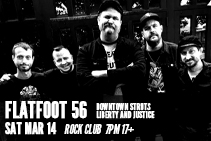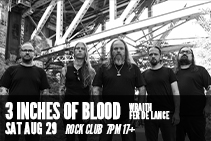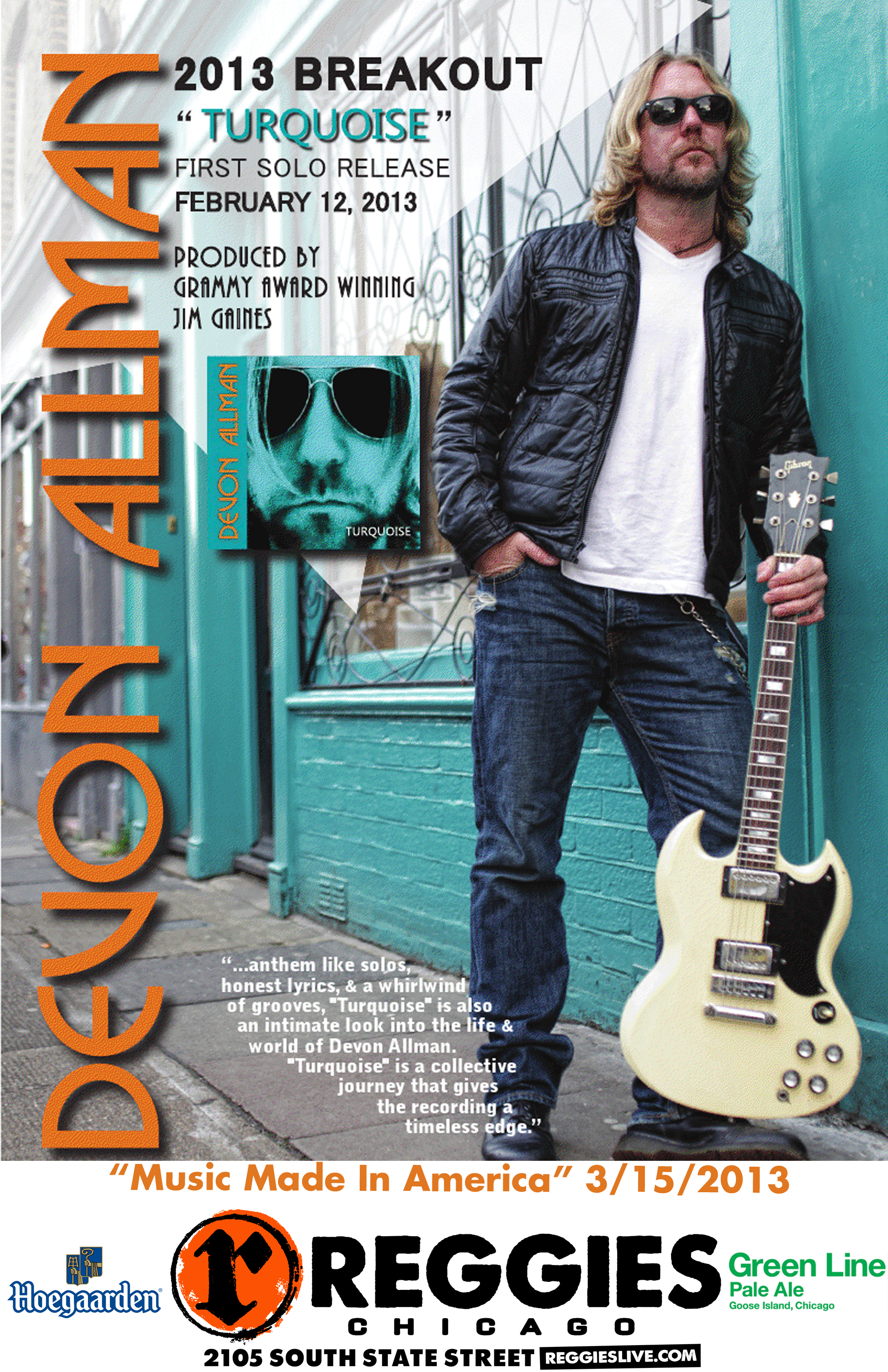

DEVON ALLMAN BAND
Ruf Records announces the signing of guitarist/singer Devon Allman and a February 12, 2013, release date for his debut solo album, Turquoise. Ruf Records is distributed in the U.S. by the Allegro Corporation. Turquoise was produced and mixed by multi-Grammy winner Jim Gaines and recorded at his Bessie Blue Studios in Stantonville, Tennessee, as well as at Ardent Studios in Memphis. Devon Allman (vocals and guitars) is joined on the new CD in a core trio set-up that features his fellow Royal Southern Brotherhood bandmate Yonrico Scott (drums and percussion), as well as Myles Weeks (upright and electric bass). Special guests include Luther Dickinson (guitar),Samantha Fish (vocals), Ron Holloway (sax), Bobby Schneck Jr. (guitar) and Rick Steff (Hammond B3 organ).
Devon Allman is a member of Royal Sothern Brotherhood, the Ruf Records band he formed along with Cyril Neville (percussion and vocals), Mike Zito (guitar and vocals), Charlie Wooton (bass) and Yonrico Scott (drums). The group’s debut self-titled CD was released in May and has been in the Top 15 on the Billboard blues chart for six months, also generating extensive radio airplay and rave critical reviews from the press.
Turquoise is loaded with very personal, honest and powerful tunes in its 11-track song list. In “Turn Off the World,” one of Devon’s most insightful compositions on the new CD, he asks to go where he can “wash off this rock and roll” so that he can cleanse his soul to start anew and refresh his mind after spending so much time on the road. There is, naturally, a road song (“Homesick”) but also a more emotionally direct lyricism at work on this new CD than at any point before in his career, with songs about walking into darkness, loving to the end, finding peace or escaping the now through a time machine. He demonstrates his affinity for Latin and African music on the rhythmic “There’s No Time” (co-written by rising star guitarist Tyler Stokes), creates a big sound with modest tools on the sing-a-long “When I Left Home” (with guest Luther Dickinson adding some slinky lead and slide guitar), and pares down to the quietest of places on the lovely “Yadira’s Lullaby” (which recalls his late uncle Duane’s acoustic guitar on the classic “Little Martha”), Turquoise represents some of the finest work in Allman’s career thus far, engaging in its scope and thrilling in its execution. This is an album of reflection of Devon’s past life and it’s the stories that only he can tell. “These songs are very special to me,” says Allman. “It’s part ‘dusty road driving music’ and part ‘tropical getaway’ music. These are the stories, feelings and reflections from my last couple of decades of forging my musical path.” The 10 originals on Turquoise include two co-written with RSB brother Mike Zito, plus a blazing version of Tom Petty’s “Stop Draggin’ My Heart Around” that really rocks, courtesy of some righteous vocals by Devon and special guest Samantha Fish.
Currently based in St. Louis, Devon Allman was born in Corpus Christi, Texas, where he grew up surrounded by a humble life along with his mother. His first love affair with music came at a young age, eventually becoming a spiritual calling that wouldn’t stop. It wasn’t long before he and his guitar joined bands, and in 1999 Devon formed his Southern rock jam band, Honeytribe. While his breakthrough into the music industry may have been blunted by his choice not to use his illustrious surname, it served the purpose of his having to avoid the burden of the barrage of questions about his famous father that even he was unsure of how to answer. It was when Honeytribe began to release CDs and tour nationally that interviews slowly began to trickle out that Devon was the son of one of the biggest names in rock music. Today, he embraces who he is and where he’s been, knowing that he has paved his own way to Turquoise.
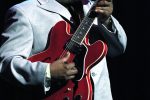
LURRIE BELL
Born in 1958, the son of famed blues harmonica player Carey Bell, Lurrie Bell picked up his father’s guitar at age of five and taught himself to play. He was clearly gifted. In addition, he grew up with many of the Chicago blues legends around him. Eddie Taylor, Big Walter Horton, Eddie C. Campbell, Eddie Clearwater, Lovie Lee, Sunnyland Slim, Jimmy Dawkins and many more were frequent visitors to his house. They all helped to shape and school him in the blues, but none as much as his father’s long-time employer Muddy Waters.
At seven years old, Bell left Chicago to live in Mississippi and Alabama with his grandparents. During this time he played mostly in the church, immersing himself in the passionate expressiveness of the gospel tradition. At fourteen he moved back to Chicago and continued to play in church as well as forming his first blues band while attending high school.
By seventeen Lurrie Bell was playing on stage with Willie Dixon. In 1977 he was a founding member of The Sons of Blues with Freddie Dixon (son of Willie) and Billy Branch. The band recorded three standout tracks for Alligator Records’ Grammy nominated Living Chicago Blues series. In 1978 Bell joined Koko Taylor’s band and stayed for several years, honing his chops and learning the ropes of being a traveling musician. He continued to work with his dad as well, recording the 1984 Rooster Blues album Son Of a Gun and several other titles for UK’s JSP Records. Not only was Bell recognized as an exceptionally talented guitarist and musician, his knowledge of different blues styles, his soulfulness and his musical maturity delivered write-ups in publications such as Rolling Stone and The New York Times.
Battling and defeating a series of personal demons kept him out of the studio and off the road for a long spell in the late 1980’s, but Bell persevered and re-surfaced in the mid-1990’s with a succession of four highly acclaimed records for Chicago’s Delmark label.
Since the onset of the new millennium, Bell’s profile has been steadily rising. 2002 saw the release of the CD Cutting Heads and in 2004 Alligator Records released Second Nature an acoustic duet record with his father Carey Bell that was nominated for a WC Handy Award Acoustic Record of the Year by the Blues Foundation in Memphis.
In 2007 Bell started his own label Aria B.G. Records and released Let’s Talk About Love, which has been called his most accomplished, deeply heartfelt album yet. On the strength of this record, he was voted Most Outstanding Guitar Player in the 2007 Living Blues Magazine’s Critic’s Poll, and in 2008 he was named the magazine’s Artist of the Year. Since 2007 he has received multiple Blues Music Award nominations as Best Guitarist and Best Traditional Male Blues Artist by the Blues Foundation.
2009 found him pairing up with Billy Boy Arnold, John Primer, Billy Branch on the recording Chicago Blues: A Living History which garnered him his first official Grammy nomination for Best Traditional Blues Recording. In 2011 a follow-up was released; Chicago Blues: A Living History (The Revolution Continues) featuring Buddy Guy, Magic Slim, and Ronnie Baker Brooks.
And now in 2012 comes the arrival of his second CD on Aria BG Records The Devil Ain’t Got No Music, a collection of acoustic blues and gospel songs that recollect the music he often played with his dad and at church in Mississippi and Alabama as a child. At last count Lurrie Bell has now appeared on over 50+ recordings either as leader or featured sideman.
Lurrie Bell’s elegant and intense guitar playing and passionate vocals have made him a favorite at clubs and festivals around the world and have earned him a reputation as one of the “leading lights” in the future of the blues.
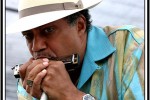
BILLY BRANCH (special guest appearance)
Billy Branch has followed a very non-traditional path to the blues. Unlike many blues artists, he isn’t from the South. Billy was born in Chicago in 1951 and was raised in Los Angeles. He first picked up a harmonica at the age of ten and immediately began to play simple tunes.
Billy returned to Chicago in the summer of ’69 and graduated from the University of Illinois with a degree in political science. It was during these years that he was introduced to the Blues. He soon became immersed in the local blues scene. He spent a great deal of time at legendary blues clubs such as: Queen Bee’s and Theresa’s Lounge; he learned from such stalwart harmonica players like: Big Walter Horton, James Cotton, Junior Wells and Carey Bell.
His big break came in 1975 during a harmonica battle when he beat Chicago legend, Little Mac Simmons at the Green Bunny Club. He made his first recording for Barrelhouse Records and began to work as an apprentice harp player in Willie Dixon’s Chicago Blues All-Stars. He eventually replaced Carey Bell and worked with Willie Dixon for six years.
During this time, Billy formed the Sons Of Blues (S.O.B.s) featuring musicians who where the sons of famous blues artists. The original S.O.B.s consisted of Billy, Lurrie Bell, Freddie Dixon and Garland Whiteside. They toured Europe and played at the Berlin Jazz Festival. Shortly afterward, they recorded for Alligator Record’s Grammy-nominated Living Chicago Blues sessions, and Billy has been a regular studio player appearing on over fifty albums.
Billy has recorded and/or performed with an incredible list of Blues legends including: Muddy Waters, Big Walter Horton, Son Seals, Lonnie Brooks, Koko Taylor, Johnny Winter, and Albert King. In 1990, he appeared with three harp legends:Carey Bell, Junior Wells, and James Cotton on W.C Handy Award winner, Harp Attack! His most recent recordings for the Polygram label are entitled The Blues Keep Following Me Around and Satisfy Me.
Billy is also passing on the blues tradition to a new generation through his Blues In The Schools program. He is a dedicated blues educator and has taught in the Chicago school system for over twenty years as part of the Urban Gateways Project. In 1996, some of his finest students opened the Main Stage at the Chicago Blues Festival which was broadcast throughout the U.S. on National Public Radio.
Blues producer, Chicago Beau has written, “Billy Branch has become a beacon, and model for his times; as an artist, and social/cutural activist… Billy Branch is a Bluesman; Billy Branch is the Blues.”








